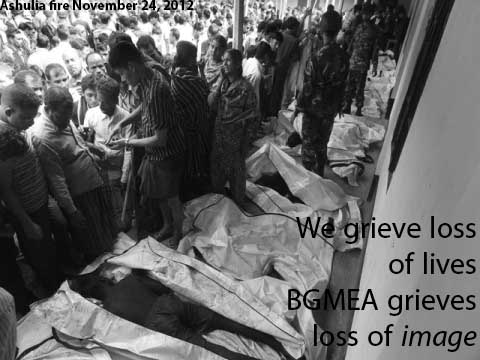
Please Retweet #garments #Bangladesh #BGMEA
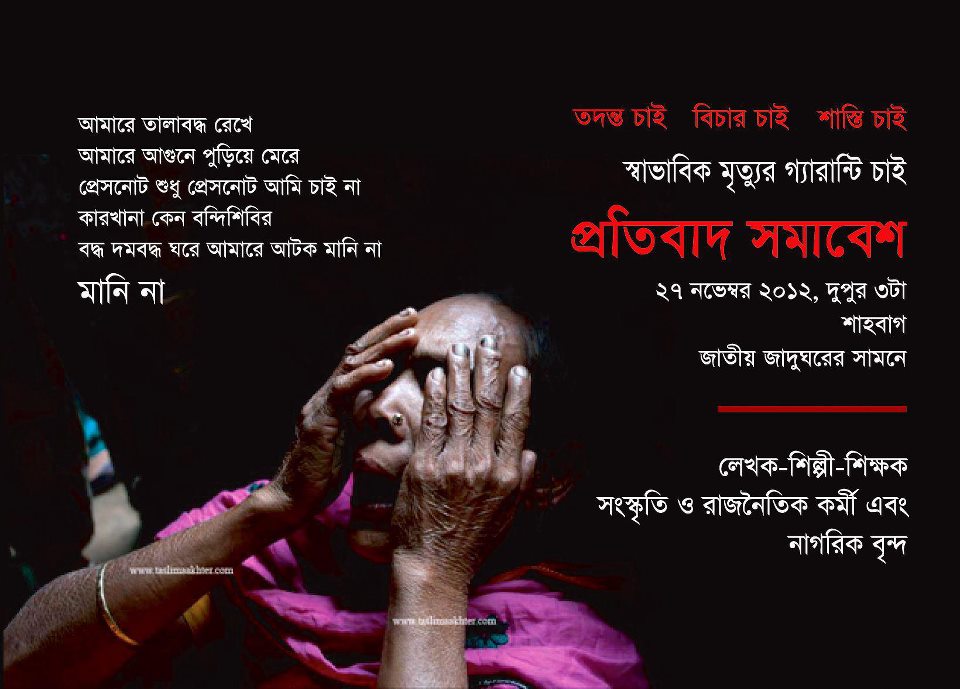
Protest called:?Outside National Museum on 27th November 2012 at 3:00 pm
They locked me
They burnt me alive
I don’t want any more press statements
Why is the factory a prison
I do not accept having to work under lockup conditions
I DO NOT!
We demand a real investigation, justice and punishment of those responsible
We want the guarantee of natural deaths?
Join the Protest Rally at 3 pm, Tuesday, 27 November 2012 outside the National Museum, Shahbagh, Dhaka
Writers-artists-teachers-cultural-political activists-citizens
Tag: garments
Bangladesh textile factory fire leaves more than 100 dead
Guardian Report?by Saad Hammadi
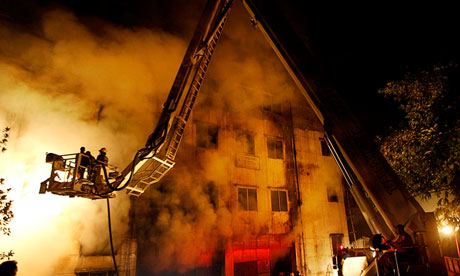 Firefighters battle the blaze at the Tazreen Fashions plant in Dhaka, Bangladesh. Photograph: Hasan Raza/AP
Firefighters battle the blaze at the Tazreen Fashions plant in Dhaka, Bangladesh. Photograph: Hasan Raza/AP
Sunday 25 November 2012
Blaze occured at Tazreen Fashions in Dhaka, which makes clothes for foreign clients including high-street chain C&A
Update on Mishu's health
Subscribe to ShahidulNews
![]()
Dear friends,
Hello, I’m sorry for not having sent my regular updates for the last two days, caused by writing deadlines.
Moshrefa Mishu’s health has worsened. Her back pain from a spinal injury has increased. She has constant fever, her heart palpitation has increased and medicine, her youngest sister tells me, is not alleviating her condition.
Police who keep her under close watch have begun behaving very badly with her family members and her organisation’s colleagues. Since Friday afternoon, 24 December 2010, they have begun shouting and using abusive language. Only one attendant is permitted to sit beside her, no one else, not even her sisters are allowed to approach her bed, or to speak with her, whether in person, or over the mobile phone.
We are deeply alarmed, both at her worsened health while in hospital, while receiving medical care and attention, and at the changed behaviour of the police on duty, overtly aggressive and abusive, that too, towards a person who has been hospitalised, that too, in a woman’s ward in a government hospital where there are other patients, most of them severely ill, since hospital authorities generally discharge a patient as s/he improves due to scarce resources and pressure for beds, medical attention and treatment.
Left political alliances held protest rallies on Friday, December 24, 2010 in front of the National Press Club, Dhaka, demanding the immediate release of Moshrefa Mishu, and Bahrane Sultan Bahar, president, Jago Bangladesh Garment Workers’ Federation. Speakers said, arresting labour leaders would not contain labour unrest, acceding to living wages and trade union rights would.
Letters of solidarity have been pouring in from both organisations and groups committed to workers rights, and individuals, both at home and abroad who are aghast and angry at the government’s repression of workers and their leaders, who are struggling hard for a bare minimum.
Please keep passing the message around, and also, pls fwd the online petition as widely as you can.
http://www.gopetition.com/petition/41542.html#fbbox
ONLINE PETITION Free Moshrefa Mishu and all detained workers immediately!
In solidarity/rahnuma
LIVING WAGES FOR GARMENT WORKERS
Subscribe to ShahidulNews
Moshrefa Mishu,?illegally arrested and remanded.
By Rahnuma Ahmed
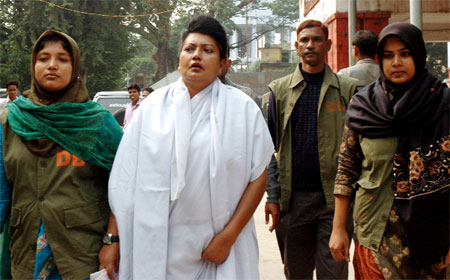
I have known Moshrefa Mishu for the last 25 years.
Since the mid-1980s when the two of us had participated in long and intense discussions with other representatives of both large womens organisations and small womens groups, when we were trying to work out the possibility of forming a broad-based and united platform to collectively struggle and further the interests of women.
In the early hours of 14 December 2010, Mishu, who is the president of Garment Workers Unity Forum, was picked up from her house in Kola Bagan, Dhaka, by a contingent of a dozen or so in plainclothes (excepting one). They claimed to belong to the Detective Branch. They did not have an arrest warrant. Please remember that, as you read along.
She was produced in the Chief Metropolitan Magistrate’s (CMM) court after midday. Police sought a 10-day remand, the magistrate granted 2 days. She was accused of inciting garment workers at Kuril who were, according to news reports, demonstrating for payment of wages according to the new pay scale agreed upon by the government and factory-owners in August 2011. Demonstrating for, not against, and mind you, the government was a party to the agreement. Does it not strike you as strange that workers should have to demonstrate and picket, and to press for demands which are in effect, also the government’s demands? (workers had unwillingly agreed to the new wages because it fell far short of their demand for 5,000 taka as minimum wage, not the 3,000 taka which was agreed upon, which has been termed `poverty wages’). Workers at Kuril alleged that the management was not following the new wage board, it had added only 500 taka to each worker’s wage. Remember Kuril too, because I’ll come back to this later. Instead of imprisoning garment workers and their leaders, one would have thought government officials and factory-owners would be arrested for not complying with the wage board’s settlement.
She was remanded again, for 1 day, on December 17. The police added another allegation to their previous list, Mishu had been seen in the company of a Jamaat leader, travelling in his car. Where? When? Not surprisingly, the police could not substantiate their allegations, they could only insist that it needed to be investigated.
Mishu was produced in CMM court for the third time on December 19, afternoon. I was among a group of activists (university teachers, writers and a lawyer) who had gone there to express our moral support for Mishu. Only Sadia Arman among us was allowed to enter the courtroom as she’s a lawyer. She spoke to Mishu who sat in a bench at the back, with women police on either side. She was breathing with great difficulty, gasping for air as she spoke. She told Sadia that short of beating her, the DB police had tortured her in every possible manner. When Sadia asked her about the allegations against her, Mishu said, she had not been in Kuril but in Narsingdi, she had returned to Dhaka on 12th night, had been exhausted and had declined to attend programmes till December 16. She did not know why she had been arrested, they had not told her anything. Please note that the protests at Kuril occurred on 12th morning and that the allegations against her are not, according to the laws of the land, worthy of a remand.
We caught a glimpse of Mishu as she left the courtroom heavily surrounded by police. I watched a young policewoman flash a smile as she said confidently, oh, there’s nothing wrong with her. She’s fine. As we turned the corner of the courtroom and stood above on the landing, we watched Mishu climb down the stairs assisted by policewomen. We could clearly see that she was unable to walk by herself. I remembered an Indian feminist friend’s excitement when Sheikh Hasina appointed Sahara Khatun as the minister for home affairs. I had not been similarly excited. The proof of the pudding is in the eating, I thought.
Mishu’s breathing difficulties increased, she had to be hospitalised immediately. She was taken to the National Hospital first, where the doctors gave her a nebuliser and oxygen. Her back pain — from a spinal injury, the result of an attempt on her life several years ago which had been staged to appear as a road accident — increased tremendously. While she had entered the hospital sitting in a wheelchair, she had to be carried out on a stretcher. She was referred to the Post Graduate hospital where doctors provided further oxygen, she was then referred to the Dhaka Medical College Hospital. She lies in a `bed’ there, in a womens ward, hastily put together on the floor, as there were no vacant beds. Police surround her bed, both men and women, causing immense distress and embarassment to both Mishu and other patients, many of whom are confined to their bed and having to use bedpans for urinary and fecal discharges.
What induced this? Mishu was without medicine for more than 24 hours, the contingent who had gone to pick her up had only permitted her to change her clothes. Despite being a chronic asthma patient, she was forced to lie on the cold floor of the DB Headquarters with only a thin blanket to lie on, and a thin quilt as cover. By the time her sister was allowed to drop her medicine at DB Headquarters, she was already very ill,
the nebuliser was unable to provide any relief. She would have preferred a prison, she told her sister, as she would at least have some hours to herself, at the DB HQ she was interrogated at all odd hours, both during the day and at night.
What is equally worrying is that officials at the DB headquarters had told her sister before the court hearing on December 19, don’t worry, we’ll provide her with some hot water tomorrow so that she can take a bath. How could they have been so sure that their prayer for a remand would be granted? Is unseen pressure being applied by the government on the judicial process?
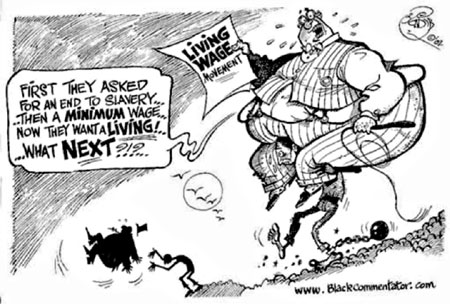
A garment worker had explained to a Reuters correspondent that the reason for protesting was “because [the new wages are] too inadequate to make ends meet. We cannot submit to the [whims] of the government and factory owners.” Another had said, “We work to survive but….commodity prices are going up and we cannot even arrange basic needs with our meagre income. The 3,000 taka will be barely enough to buy food for my six-member family. How can I pay for medicines, the education of my children and other needs?” Nurul Kabir, the editor of this paper, in a talk show on a private TV channel the night Mishu was arrested, had said, he would like to give factory owners Tk 3,000 per month, for a period of three months, and would like to see how they managed to live on this meagre amount. I agree with him, I think such an exercise, conducted publicly, with daily updates, would prove to be tremendously educational.
Or, one could reverse what the Italian Marxist Antonio Gramsci, imprisoned from 1926-1937 (the prosecutor had said at his trial “for 20 years we must stop this brain from functioning”), had written to a family member, from prison: “tell me what the following categories of people eat in a week: a family of,
- day labourers
- sharecroppers
- small farmers who work their own land
- shepherds whose flocks are a full-time occupation
- craftsmen (cobblers or blacksmiths)
Questions: how many times do they eat meat in a week, and how much? Or alternatively, do they just go without? What do they use to make soup? How much oil or fat do they put in, how much pasta, how many vegetables etc.? How much corn do they grind, and how many loaves of bread do they buy? How much coffee or coffee substitute, how much sugar? How much milk for the children etc.?”
Reversing Gramsci’s questions would mean that I would like to know how many times a week the owners of garment and knitwear factories?those who receive orders, and deliver supplies to Wal-mart, Marks & Spencer, Carrefour, Tesco, JC Penny, H&M, Gap?eat meat, how much oil and butter they consume, how much rice, what quality, how much coffee and beverages they drink, how much they spend on medicine and health, on their childrens education, on holidays, and all other personal and familial needs. I would also like to know how much they contribute, both directly and indirectly, to the election funds of political parties.
At her first court hearing, Mishu had stood in the dock and had asked, `Am I a common criminal that I should have to be handcuffed like this?’
No Mishu, neither you, nor other labour leaders, nor workers demonstrating for living wages, none of you are criminals. Those denying living wages to garment workers, are. It is they who are criminals. Your struggles serve to expose them for what they really are underneath their smooth and slick smiles, their expensive clothes. Petty, miserable, brutal. The real criminals.
Published in New Age, Tuesday December 21, 2010
Support campaign for release of Moshrefa Mishu
Imprisoned, or dead. Reflections on Victory Day, 2010
Subscribe to ShahidulNews
By Rahnuma Ahmed
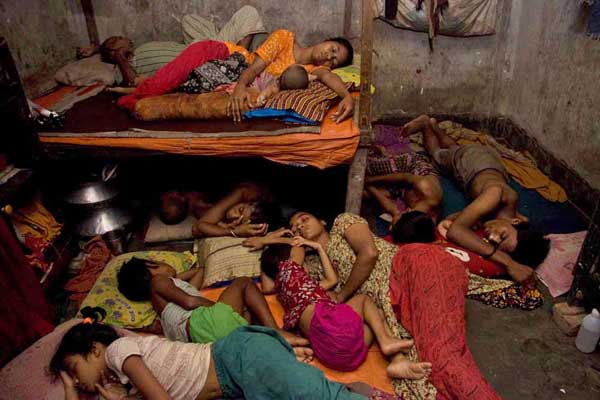
My heart was heavy on Victory Day.
On Dec 12, four people, including a rickshaw driver aged 35, were killed in Chittagong EPZ as garment workers clashed with police because the new wage structure when implemented, meant getting lesser wages. According to news reports, the management of South Korean-owned Youngone suddenly shut down all its units after workers protested the withdrawal of their Tk 250 lunch allowance. When 10,000 workers turned up for work on Sunday morning, they found the factory closed down for an indefinite period. Demonstrations and picketing took a violent turn when police opened fire with live bullets (600 rounds) and tear gas shells (150 canisters). Workers retaliated with brickbats, sticks and stones. The Deputy Commissioner (Port) in Chittagong claimed, rickshaw-driver Ariful Islam had died from a hurled brick; his employer however said, he had been shot dead. Eight injured persons had bullet wounds. Police filed cases against an unidentified 33,000.
Less than two days later, in the early hours of December 14, a contingent of 12 or so claiming to belong to the Detective Branch, all in plainclothes except 1, turned up at the Kola Bagan house of Moshrefa Mishu, president of Garments Workers Unity Forum. When her sister Jebunnessa wanted to see a warrant, they threatened to arrest her too. Mishu was only allowed to change her clothes, she had to leave her medicine behind: for asthma, and for a severe spinal injury from an attack on her life several years ago. She was produced in court after midday and remanded for 2 days on charges of inciting vandalism during worker unrest in Kuril (Kafrul, Dhaka) in June this year. At the end of 2 days, she was remanded for yet another day. She had Jamaat links, they alleged. It needed further investigation, they said.
Mishu? Remanded? For inciting vandalism? As we sat stunned with this news on the 14th, the gods played a cruel joke.
On December 14, a fire broke out in Ha-Meem Group’s sportswear factory in Ashulia, Dhaka. Fire spread to the dining area on the 10th floor where about 150 workers were having lunch. “Emergency exits were closed,” said Abdul Kader to Asia Times Online. To escape from the rapidly-spreading flames, 50-60 workers jumped off the tenth floor. Many, to their death.
Ha-Meem management says 23 died; hospital and clinic sources report 26 deaths, some newspapers report 31 but workers insist many more as relatives throng at the factory gates in search of missing family members. After being closed for two days to mourn the deaths of workers, it was re-opened on Friday, the weekly holiday, but also, a public holiday due to Ashura. The next day, a large chunk of concrete fell on the floor of the 8th floor, as the devastation caused by the fire was being repaired. Workers rushed out of the building fearing for their lives. At least 25 were injured.
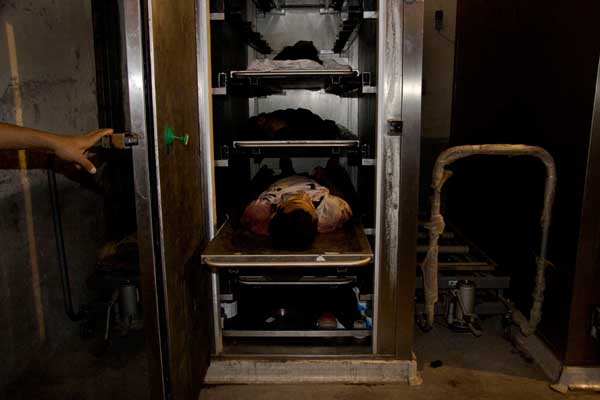
According to the Fire Service and Civil Defence Department, fires broke out in 213 factories between 2006 and 2009. The number of deaths? 414. These figures include the Spectrum/Shahriyar Sweater factory collapse in 2005, when 64 workers were killed and 80 were injured, 54 seriously. It excludes the deaths caused by fire which broke out this February at Garib & Garib Sweater factory, built on marshy land. 21 workers’ died, another 50 were injured.
According to international groups dedicated to improving the working conditions of workers worldwide, the Bangladeshi garment industry is “notorious” for its bad safety record. Most of the deaths and injuries are entirely “preventable.” According to the Clean Clothes Campaign, a global network of labour and women’s rights organisations, Bangladeshi factory owners “blatantly violate building code and health and safety regulations”; the government (regardless of which party is in power) “fails to enforce these regulations.” At Garib & Garib, fire rapidly spread because the floors were filled with inflammable materials such as wool threads, workers who were cut off by the fire could not escape because emergency exits were locked; material piled-high blocked the stairways. Fire brigade officials said, the factory’s fire-fighting equipment was “virtually useless.”
The joke played by the gods was undoubtedly cruel since it snatched away many lives? 23? 26? 31? more??but it pointed fingers as well.
Has any factory owner ever been picked up by the police, remanded, arrested, and charged because of factory fires? Not that I know of. The officer-in-charge of Ashulia thana says, (only) a general diary has been lodged in connection with the fire at Ha-Meem. Interestingly, Ha-Meem Group’s managing director AK Azad is also the president of the Federation of Bangladesh Chambers of Commerce and Industry (FBCCI).
Just as factory fires are not properly investigated, neither are acts of vandalism. One hears ministers, high party officials, intellectuals-serving-party-interests and experts claim every so often that these are caused by `outsiders.’ But these `outside forces’ are never specified. Despite turf wars over waste cloth from the garment industry (jhoot baybsha). Despite cutthroat competition among some of the owners themselves. Despite rumours that some were initiated to claim insurance. Despite competition between exporting nations, too. It is much easier to demonise Mishu, other garment leaders, and workers in general. After all, who knows what Pandora’s box a genuine investigation will open?
Nearly three and half million work in the RMG sector, mostly women. It accounts for 80% of annual export earnings and makes clothes for major Western brands such as Wal-mart, Marks & Spencer, Carrefour, Tesco, JC Penny. In 2006, the monthly minimum wage was fixed at Tk 1,662 (US$23). Since then, despite spiralling prices and soaring living costs, garment workers had received no pay rises, although Bangladeshi labour law dictates that wages should be reassessed and adjusted every three years. The new minimum wage approved in August this year?at 3,000 taka ($43) it fell far short of labour union demands of 5,000 taka ($72)?was grudgingly agreed upon by owners, unwilling to give Eid bonuses according to the new wage structure. Last year, the president of Bangladesh Garment Manufacturers and Exporters Association (BGMEA) had demanded a 30 billion taka subsidy ($428 million) from the government’s stimulus package fund to pay workers wages and bonuses. It was outrageous even by AL government’s standards which, as Shahidullah Chowdhury, president, Bangladesh Trade Union Centre, points out, is “essentially biased” towards protecting and promoting the interests of the rich. The finance minister rejected it outright, leaving the BGMEA mumbling that it was an “error.”
Clashes occurred in November this year because many factories had either failed to implement what had been agreed upon, or had implemented it through applying a grading system which effectively “lessened” the pay of many workers.
As I write, I remember Mishu telling me many years ago, I seem to be spending my life fighting for basic rights, those that are declared in the ILO Convention, are laid down in Bangladesh law. Struggling for more fundamental changes, for the re-distribution of wealth and resources, is a far cry. These basic rights should be enforced by the government, she said. In its own interest.
Was muktijuddho not fought for ensuring economic and social justice? For changing the lives of the greater majority for the better? The Awami League and its intelligentsia would have us believe that it was fought only against religious forces who had collaborated with the Pakistan government and its army, a sore enough point for the nation given post-1971 events. Given that the war criminals of 1971 were politically restored, given that Jamaat-e-Islami became BNP’s electoral allies, became a part of the government. But the trial of war criminals is a national issue, it should not be subjugated to serve the narrow interests of the Awami League. Nor should we allow it to be capitalised upon by imperial forces, to draw us into the ever-expanding `war on terror.’
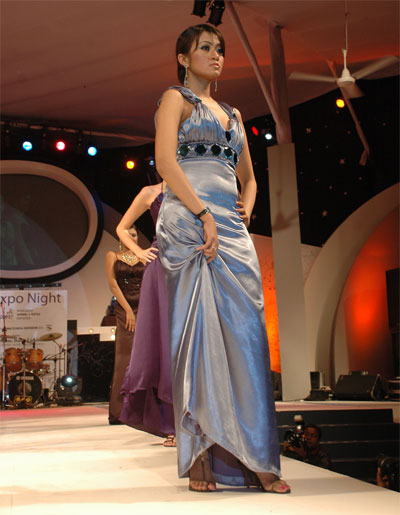
The adoption and pursuit of neo-liberal policies have led to the emergence of new forms of femininities in Bangladesh. Women pose, strut down the aisle. The closed-off, vacant look they are trained to wear makes it difficult to tell whether they know that the garments they parade are soaked in sweat. In tears. And, in blood. Of other women.
__________________________________________
Published in New Age, Monday December 20, 2010
